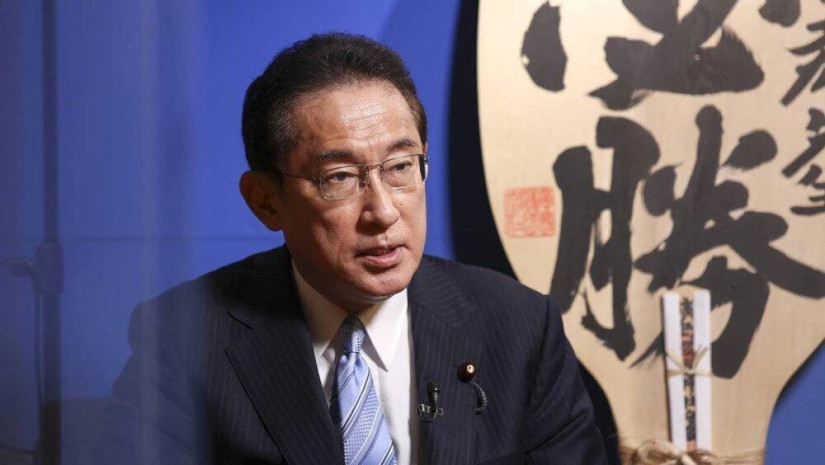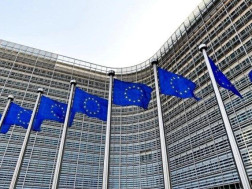Japan on Friday approved a new national security strategy — one of the country's largest defense shake-ups since World War II.
This is a marked shift from the country's pacifist approach, which has dominated its political discourse for decades.
Japan's military spending has been beefed up to counter threats from China and a heavily armed North Korea. The country's security officials warned that China currently poses the "greatest strategic challenge ever."
The cabinet approved three documents which outlined the strategy shift — the National Security Strategy (NSS), the National Defense Program Guidelines, and the Mid-Term Defense Program.
The move will now ramp up Japan's security expenditure from 1% of GDP to NATO's standard of 2% of GDP by 2027.
US hails move to boost defense spending, China raises concerns
US National Security Adviser Jake Sullivan on Friday said that Japan's goal to increase defense investments would "strengthen and modernize the US-Japan alliance."
US Secretary of Defense Lloyd Austin said the move showed "Japan's staunch commitment to upholding the international rules-based order and a free and open Indo-Pacific."
US and Japan are close security allies, and Japan is part of US' strategic alliance, along with India and Australia, to contain China.
On the other hand, China's Foreign Ministry urged Japan on Friday to "reflect on its policies."
"Japan disregards the facts, deviates from the common understandings between China and Japan and its commitment to bilateral relations, and discredits China," Ministry spokesman Wang Wenbin told reporters.
Japan raises counter-strike capacity
The most closely watched changes will be the acquisition of what Japan calls "counter-strike capacity." This is the ability to strike other nations that may threaten Japan's safety.
The approved documents warn that Japan's current missile interception systems are no longer sufficient.
As per reports, the country will now buy up to 500 US-made Tomahawk cruise missiles which can reach a distance of 1,250 kilometers (775 miles).
Tokyo will also triple the number of military units equipped with ballistic missile interception capabilities.
Under the new strategy, the country will increase its military presence in its southernmost islands to counter Beijing's threats.
Other changes include the reshaping of the military command.
Japan's Self-Defence Forces (SDF) will be reorganized and placed under a newly appointed permanent joint command to respond more quickly to emergencies.
By March 2024, Japan's military personnel will be permitted to use civilian ports and airports.
According to reports by the newspaper Yomiuri, which said that it had seen the draft of the plan, Tokyo will spend close to $22 billion towards cyber warfare operations and $14 billion on space capabilities.
Japan's new hardline approach towards China and Russia
The defense revamp has significantly hardened the government's language towards China and Russia.
Meanwhile, Japan, which once sought enhanced ties and cooperation with Russia, now warns Moscow of its military posture in Asia and calls its proximity to China — "a strong security concern."
Earlier in October, Japan joined its Western allies in imposing sanctions over Russia's Ukraine invasion.
Dr. Tomohiko Taniguchi, a professor of international political economy at Keio University in Tokyo told DW the military spending boost was "significant" and "long overdue."
"Japan is an immediate neighbor to Russia, North Korea and China," he told DW. "That's not something that you could envy."
But the former special adviser to Japan's late Prime Minister Shinzo Abe said "more has to be done" to fend off the threat of China and Russia.
Professor Taniguchi also said "without Japan, the United States could achieve very little when it comes to its engagement in the Indo-Pacific area."
With 120 active bases, Japan has the highest number of US bases in the world followed by Germany with 119..
Public backs the hiked defense expenditure
The country's doubled defense budget will be funded by a raise in corporate, income and tobacco taxes.
The hike was approved on Thursday by a tax panelof Japan's ruling Liberal Democratic Party (LDP).
Chinese Prime Minister Fumio Kishida called the overhaul an "urgent challenge in this severe security environment."
According to polls, worried by growing regional threats, Japan's public largely backed the shift.
Nevertheless, the changes could still prove controversial as the country's post-World War II constitution does not recognize the military and reduces it to nominal self-defense capabilities.
South Korea lodges protest against Japanese claim over disputed islands
South Korea's Foreign Ministry on Friday demanded an immediate removal of territorial claims from Japan's national security plan, saying in a statement that the move did nothing to help "building a future-oriented relationship" between the two countries.
Relations between Seoul and Tokyo have been at their worst in years, with US President Joe Biden calling upon the countries to mend relations earlier this year.
Seoul and Tokyo have long fought over contested islands that are currently administered by Seoul, but claimed by Japan. The relations between the two are also colored by historic disputes stemming from imperial Japan's occupation of Korea from 1910 until 1945.
South Korea's Foreign Ministry later added that it summoned a senior diplomat from Japan's embassy in Seoul to lodge its protest, DW reports.
















